Related Research Articles
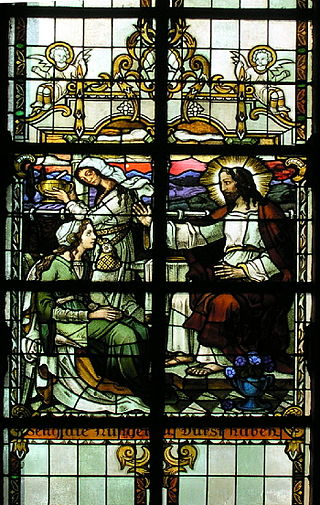
Matthew 5:6 is the sixth verse of the fifth chapter of the Gospel of Matthew in the New Testament. It is the fourth verse of the Sermon on the Mount, and also the fourth of what are known as the Beatitudes.
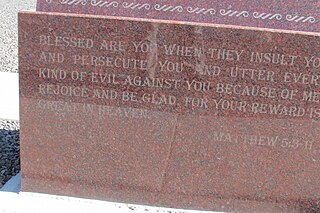
Matthew 5:11 is the eleventh verse of the fifth chapter of the Gospel of Matthew in the New Testament. It is the ninth verse of the Sermon on the Mount. Some commentators consider this verse to be the beginning of the last Beatitude, but others disagree, seeing it as more of an expansion on the eighth and final Beatitude in the previous verse.
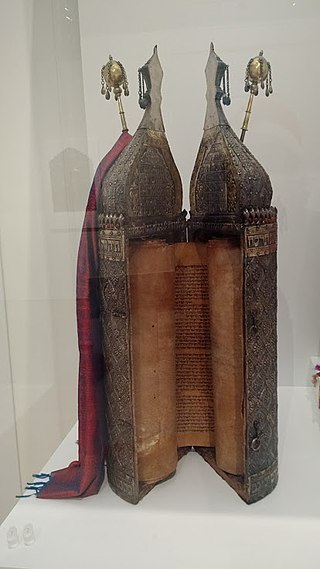
The Tawrat, also romanized as Tawrah or Taurat, is the Arabic-language name for the Torah within its context as an Islamic holy book believed by Muslims to have been given by God to the prophets and messengers amongst the Children of Israel. In the Qur'an, the word 'Tawrat' occurs eighteen times. When referring to traditions from the Tawrat, Muslims have not only identified it with the Pentateuch, but also with the other books of the Hebrew Bible as well as with Talmudic and Midrashim writings.
Indeed, We sent down the Torah, in which was guidance and light. The prophets who submitted [to God] judged by it for the Jews, as did the rabbis and scholars by that with which they were entrusted of the Scripture of God, and they were witnesses thereto. So do not fear the people but fear Me, and do not exchange My verses for a small price [i.e., worldly gain]. And whoever does not judge by what God has revealed - then it is those who are the disbelievers.

Matthew 5:40 is the fortieth verse of the fifth chapter of the Gospel of Matthew in the New Testament and is part of the Sermon on the Mount. This is the third verse of the antithesis on the commandment: "Eye for an eye".
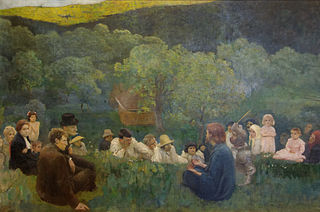
Matthew 6:25 is the twenty-fifth verse of the sixth chapter of the Gospel of Matthew in the New Testament and is part of the Sermon on the Mount. This verse shifts the discussion from one of money to one of worry.

Matthew 6:34 is “Therefore do not worry about tomorrow, for tomorrow will worry about itself. Each day has enough trouble of its own.” It is the thirty-fourth, and final, verse of the sixth chapter of the Gospel of Matthew in the New Testament and is part of the Sermon on the Mount. This verse concludes the discussion of worry about material provisions.
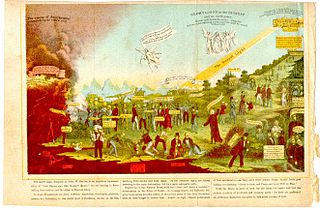
Matthew 7:14 is the fourteenth verse of the seventh chapter of the Gospel of Matthew in the New Testament and is part of the Sermon on the Mount. This verse continues a metaphor begun in the previous one about the ease of following the wrong path.

Matthew 7:21 is the twenty-first verse of the seventh chapter of the Gospel of Matthew in the New Testament and is part of the Sermon on the Mount. This verse continues Jesus' warning against false prophets.
Matthew 11:29 is the 29th verse in the eleventh chapter of the Gospel of Matthew in the New Testament.
Matthew 11:27 is the 27th verse in the eleventh chapter of the Gospel of Matthew in the New Testament.
Matthew 11:28 is the 28th verse in the eleventh chapter of the Gospel of Matthew in the New Testament.
Matthew 15:13 is a verse in the fifteenth chapter of the Gospel of Matthew in the New Testament.

Matthew 10:32 is the 32nd verse in the ninth chapter of the Gospel of Matthew in the New Testament.
Matthew 10:37 is a verse in the tenth chapter of the Gospel of Matthew in the New Testament.
Matthew 10:22 is a verse in the tenth chapter of the Gospel of Matthew in the New Testament.
Matthew 12:20 is the 20th verse in the twelfth chapter of the Gospel of Matthew in the New Testament.

Messiah, the English-language oratorio composed by George Frideric Handel in 1741, is structured in three parts. The wordbook was supplied by Charles Jennens. This article covers Part I and describes the relation of the musical setting to the text. Part I begins with the prophecy of the Messiah and his virgin birth by several prophets, namely Isaiah. His birth is still rendered in words by Isaiah, followed by the annunciation to the shepherds as the only scene from a Gospel in the oratorio, and reflections on the Messiah's deeds. Part II covers the Passion, death, resurrection, ascension, and the later spreading of the Gospel. Part III concentrates on Paul's teaching of the resurrection of the dead and Christ's glorification in heaven.
Matthew 11:4-6 is a set of verses in the eleventh chapter of the Gospel of Matthew in the New Testament.
Matthew 12:17-18 are two verses in the twelfth chapter of the Gospel of Matthew in the New Testament.
Matthew 12:49-50 are verses in the twelfth chapter of the Gospel of Matthew in the New Testament.
References
- ↑ John MacEvilly, An Exposition of the Gospel of St. John consisting of an analysis of each chapter and of a Commentary critical, exegetical, doctrinal and moral, Dublin Gill & Son 1879.
- 1 2 3 4 5 6 7 "Catena aurea: commentary on the four Gospels, collected out of the works of the Fathers: Volume 6, St. John. Oxford: Parker, 1874. Thomas Aquinas". 1874.
 This article incorporates text from this source, which is in the public domain .
This article incorporates text from this source, which is in the public domain . - ↑ Block, Daniel I. (2001). "Handel's Messiah: Biblical and Theological Perspectives" (PDF). Didaskalia . 12 (2). Retrieved 19 July 2011.